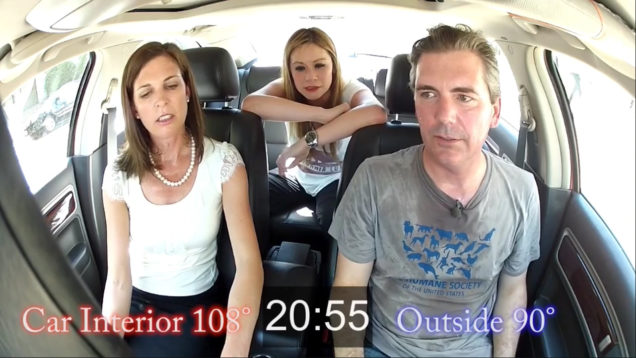In this promotional video produced by California Assembly Republicans on May 16, 2016, lawmakers advocate for Assembly Bill 797, which would allow people to break dogs out of hot cars. From left, they are Assemblymembers Kristin Olsen of Riverbank, Ling Ling Chang of Diamond Bar and Marc Steinorth of Rancho Cucamonga. Jeremy B. White jwhite@sacbee.com
Story By Jeremy B. White | The Sacramento Bee
By the time Sharie Lesniak finished her errand at the bank, the dog she had noticed waiting in a car on her way in had started panting and showing signs of distress.
So Lesniak called 911. Before the authorities arrived to free the animal, the owners showed up. They weren’t pleased.
“The person started harassing me and asking me if I was a veterinarian, how dare I tell him how to take care of his dog,” Lesniak said.
As the founder of mydogiscool.com, a website devoted to guarding against dogs overheating in cars, Lesniak was accustomed to explaining the law against endangering animals by leaving them in hot vehicles. She knew she could call the authorities.
But a new bill would give her another option, allowing Californians to smash car windows and break imperiled animals out of vehicles that are too hot or cold without facing a civil lawsuit.
“A dog can go into organ failure and brain damage within 15 minutes,” Lesniak said. “So it is something to know you can do something if they don’t get there in time.”
“These owners, they just don’t realize how hot it can get.”
Assemblyman Marc Steinorth, R-Rancho Cucamonga
After noticing that Tennessee had enacted a similar law, Assemblyman Marc Steinorth, R-Rancho Cucamonga, wanted to pursue the option for California. He and fellow lawmakers spent 21 minutes in a hot car last week to promote the bill.
“I still don’t think I’m fully hydrated,” he said several days later. “All the time we hear about animals that are dying being trapped in hot cars. These owners, they just don’t realize how hot it can get, and I wanted to create legislation that enables us to be proactive.”
Because they can’t vent heat by sweating, dogs can become dangerously overheated faster than humans. According to the American Veterinary Medical Association, the temperature inside a car can soar rapidly: on a 70-degree day, a car interior can reach 89 degrees in 10 minutes and climb to 99 degrees after 20. Parking in the shade or cracking windows doesn’t necessarily prevent the car’s interior from reaching dangerous temperatures.
With planned amendments, the measure wouldn’t give people carte blanche to start shattering windshields or jimmying locks. “I hope we don’t have people who use this legislation as an excuse to randomly break windows,” Steinorth said, “but I just don’t think that’s going to happen. I think people are smarter than that.”
In order to liberate a dog without fear of being sued, they would need to confirm the car is locked and that there’s no “reasonable method” available other than forcible entry, believe the dog is in imminent danger, and contact authorities and then wait for them to arrive.
“If you want the benefit of being protected by this immunity you have to take these steps first,” said Jennifer Fearing, a lobbyist for the Humane Society, which is co-sponsoring the bill. “You can’t walk up to a car, look around and not see anyone, and bust the dog out.”
“Animal rights people just go off their rocker with this sort of thing.”
Debbie Tandoc, field vice president for the NorCal Golden Retriever Club
But the bill seems likely to raise questions from dog owners concerned about overzealous liberators. Debbie Tandoc, field vice president for the NorCal Golden Retriever Club, said she has already her anecdotes about vehicles being broken into.
“There has to be some real specific guidelines so that everybody’s protected, because maybe someone’s car is broken into but hey, there’s air conditioning on and the dogs are just anxious and hyperventilating because their owner left them,” Tandoc said. “Animal rights people just go off their rocker with this sort of thing.”
An earlier version of the bill would have also covered children in cars, but supporters decided the law already protects kids in those situations. The Los Angeles County District Attorney’s office is co-sponsoring the bill, conferring the legitimacy of law enforcement backing.
Animal control officials regularly respond to calls about pets trapped in hot cars, Sacramento Animal Control manager Gina Knepp said, calling the parking lots at Cal-Expo and Arden Fair Mall the most common places her officers respond to dogs locked in cars.
“Most people don’t do it out of maliciousness. They do it out of ignorance,” Knepp said. “They say they’re only leaving them for a minute, then they get distracted and it’s 30 minutes and you come back and your dog is dead.”
The ideal solution, Knepp said, would be leaving dogs at home whenever the temperature rises above 68 degrees. Cars can become significantly hotter than the air around them. But dog owners unwilling to separate from their beloved pets often do bring the dogs along.
“Most people don’t do it out of maliciousness. They do it out of ignorance. They say they’re only leaving them for a minute, then they get distracted and it’s 30 minutes and you come back and your dog is dead.”
Sacramento Animal Control manager Gina Knepp
“Most people who leave their animal in the car really care about their dogs,” said Sacramento Animal Control Officer Jace Huggins. “The people who don’t care about their animals leave them tied up in the yard.”
That forces a set of choices both for passersby, who must decide whether to contact authorities, and for responders who must decide whether to rescue an animal. If the car is in a cool place, there’s water available and the dog seems content, authorities might move along.
“In cases like that we leave the dog alone,” Sacramento Fire Department spokesman Chris Harvey said. “It’s what we call a good intent call.”
Often, though, authorities do decide to free the animals. After they act, owner can face criminal penalties for allowing their animal to suffer or, if help arrives too late, to die. That hinges on factors that include the temperature inside the car and the dog’s breed, since short-snouted dogs do a worse job coping with heat.
“It is completely legal to leave your dog in the car, unless you do so in circumstances that could cause it to suffer or die,” Huggins said.
Given his ample experience with overheated dogs and owners surprised to face criminal liability, Huggins said he appreciates the rationale for the bill – as long as it’s written carefully.
“There are many times where authorities can’t get out fast enough, and if there’s someone who’s on site and the animal is suffering, it would be good for them not to fear retaliation or retribution,” Huggins said, but only after “making sure folks aren’t breaking windows for every dog they see in a car.”
Read the original post at The Sacramento Bee
ABOUT THE AUTHOR
Story By Jeremy B. White | The Sacramento Bee
Jeremy B. White: 916-326-5543, @CapitolAlert






